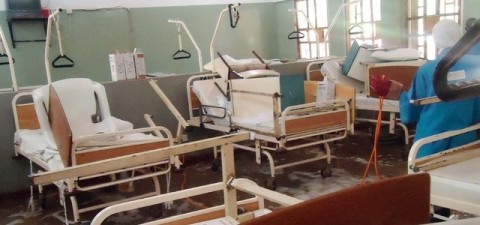WHO Seeks Integration Of Hepatitis B In Antenatal Care Services
African News, Featured, Latest Headlines, News Around Africa Wednesday, July 28th, 2021
(AFRICAN EXAMINER) – World Health Organization (WHO) has said that it is currently seeking to integrate hepatitis B interventions into antenatal care services.
WHO Regional Director for Africa, Dr. Matshidiso Moeti disclosed this in a message to mark this year’s World Hepatitis Day, under the theme, “Hepatitis Can’t Wait”.
Dr. Moeti said the WHO is also working towards strengthening its partnership with relevant stakeholders in the heath sector with a view to scaling up hepatitis B interventions.
“We are seeking to integrate hepatitis B interventions into antenatal care services. We also want to strengthen collaboration with key partners, such as the Organization of African First Ladies for Development, which have championed progress towards a HIV-free generation. By expanding programmes to incorporate hepatitis, action can be quickly scaled up.
“So, this World Hepatitis Day, I urge all stakeholders in maternal and child health to consider how hepatitis can be integrated into existing initiatives such as the First Ladies ‘free to shine’ initiative which is working in countries for an AIDS-free generation in Africa”, she said.
She noted that around 4.5 million African children under five years old are infected with chronic hepatitis B, reflecting an enormous 70 percent of the global burden in this age group.
She added that the global target of less than 1 percent incidence of hepatitis B in children under 5 years has been reached, but the African Region, according to her, is lagging behind at 2.5 percent.
“In Africa, hepatitis is a silent epidemic. More than 90 million people are living with hepatitis in the region, accounting for 26 percent of the global total. More than 124,000 Africans are dying every year from the consequences of undetected and untreated hepatitis.
“Most of these cases could be prevented by eliminating mother-to-child transmission of the disease, during or shortly after birth and in early childhood. Key interventions against hepatitis B include vaccination at birth and in early childhood, screening pregnant women, and providing timely treatment”, she added.
The regional director said WHO marked the Day to increase awareness of the disease, which inflames the liver and can lead to liver cancer and cirrhosis.
Health systems, according to her, also play vital roles in preventing transmission by making sure blood donations are screened and that syringes are only used once and then safely disposed.
Dr. Moeti also observed that only 14 countries in the Africa are implementing hepatitis B birth-dose vaccine, adding that among people who are infected, nine out of 10 have never been tested because of limited awareness and access to testing and treatment.
She equally pointed out that even among countries offering hepatitis B birth-dose vaccine, health systems are facing challenges in ensuring pregnant women and mothers are tested and that those who test positive are treated.
“I want to encourage individuals to seek testing and treatment for hepatitis and to learn more about this disease, to end the silent epidemic. So, in the WHO African Region, we are urging especially that ‘mothers can’t wait’. We are encouraging countries to integrate the Hapatitis B PMTCT in the Ante-Natal Care package together with the HIV and Syphilis PMTCT programmes”, she stressed.
She also stated that with the launch of the first global strategy on hepatitis in 2016, along with increased advocacy in recent years, political will was starting to translate into action in the region.
“Considering this advantage, African Heads of States have committed to address viral hepatitis as a public health threat in the Cairo Declaration in February 2020. In this line, the Egyptian Initiative planned to provide hepatitis C treatment for 1 million Africans. So, far, this initiative has reached more than 50,000 people in South Sudan, Eritrea and Chad.
“A part of them, Rwanda, Uganda, and Benin have established free testing and treatment programmes for hepatitis, and 16 other countries are starting pilot projects in this direction”, she further disclosed.
Similarly, to guide action on hepatitis, 28 African countries now have strategic plans in place and at the global level WHO guidelines were launched last year on prevention of mother-to-child transmission of hepatitis B.
Dr. Moeti also noted that Hepatitis medicines have become much more affordable, with prices as low as US$ 60 per patient for a 12-week treatment. She added that there are many promising developments on hepatitis.
She said the WHO Regional Office for Africa was developing training materials in order to help countries implement the five hepatitis core interventions and decentralize the diagnosis and treatment.
“This year’s theme is “hepatitis can’t wait” and we call on all countries to rapidly improve access to services to prevent, diagnose and treat hepatitis”, she stressed.
Related Posts
Short URL: https://www.africanexaminer.com/?p=65920




















